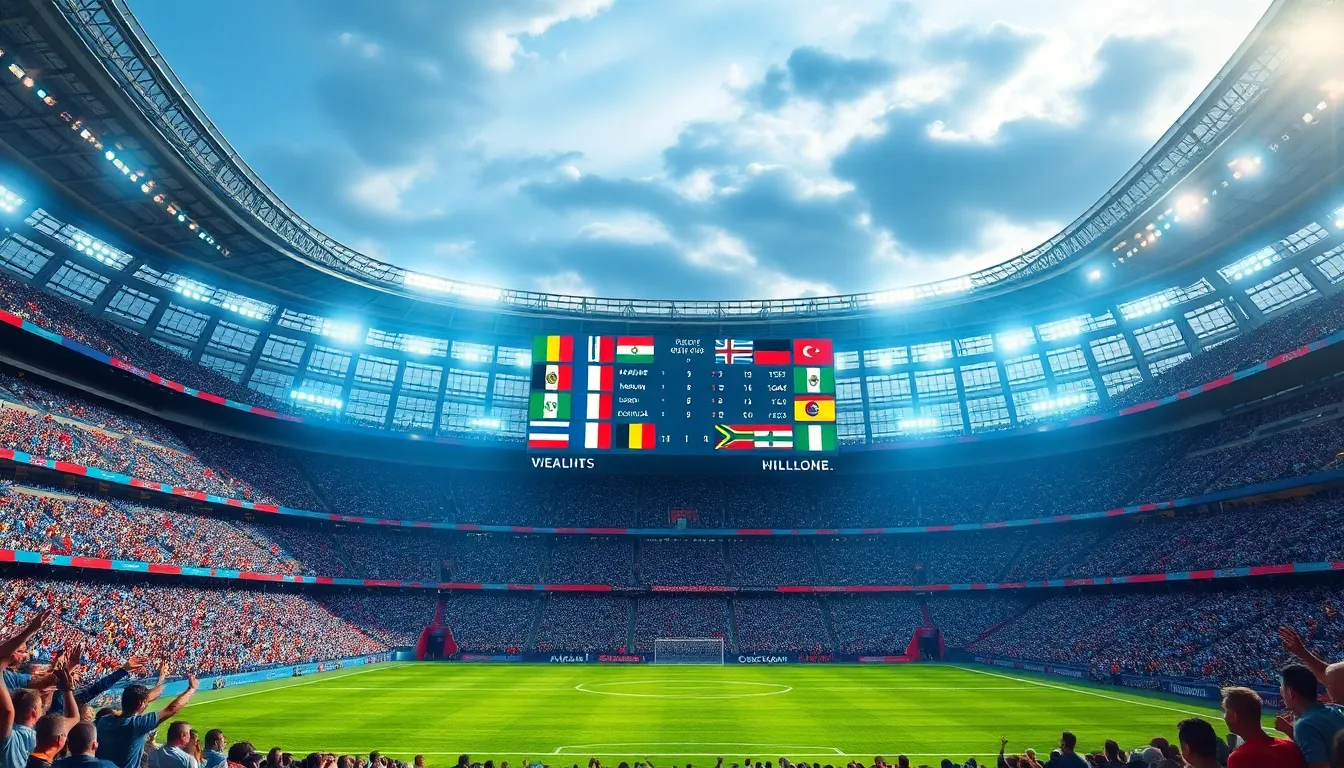Table of Contents
ToggleIn the world of soccer, glory isn’t just about the trophies; it’s about the teams that make fans jump out of their seats and question their life choices. Picture this: a last-minute goal that sends the crowd into a frenzy, or a perfectly executed play that leaves opponents scratching their heads. The best teams in FIFA don’t just play the game; they redefine it.
From the dazzling footwork of seasoned pros to the heart-stopping moments that keep viewers on the edge of their seats, these teams have mastered the art of soccer. Whether they’re dribbling through defenders or celebrating a hard-fought victory, their passion and skill create unforgettable experiences. Buckle up as we dive into the world of FIFA’s best teams, where every match is a story waiting to be told, and every player is a hero in the making.
Overview of FIFA Best Teams
FIFA ranks the best teams based on performance in international competitions. These teams consistently display skill, strategy, and teamwork that sets them apart. For instance, Brazil holds the record with five World Cup titles, showcasing its long-standing dominance in the sport. Germany and Italy follow closely, each with four championships, demonstrating their competitive edge.
Top teams also engage in FIFA’s annual rankings, taking into account match outcomes. As of October 2023, the rankings spotlight teams like Argentina and France, reflecting their recent successes. Argentina, known for its high-caliber players, recently won the World Cup, reinforcing its status among the elite. France remains a formidable force, boasting a blend of experience and emerging talent.
Notably, clubs such as Manchester City and Bayern Munich excel in club competitions. Their successes in domestic leagues and UEFA tournaments further emphasize the strength of club soccer. Players from these teams frequently rise to individual accolades, contributing to their teams’ reputations.
Various factors influence a team’s ranking, including recent match performances, head-to-head results, and overall team cohesion. A strong coaching staff plays a vital role in honing skills to achieve the desired results. Innovations in training methods and tactics also elevate teams to a higher level.
FIFA’s best teams create a tapestry of competition, thrilling fans worldwide. Each match provides an opportunity for history to be made, with rivalries intensifying the excitement. The world awaits every tournament, eager to witness the top teams compete for glory.
Criteria for Ranking

FIFA ranks teams based on specific criteria that reflect both historical achievements and current performance levels.
Historical Performance
Historical performance plays a crucial role in team rankings. Teams accumulate points from past World Cups and continental championships. Brazil stands out with five World Cup titles, maintaining a historic legacy. Germany and Italy follow with four championships each, showcasing consistent success over decades. These historical accolades contribute significantly to a team’s reputation and ranking within FIFA. Engaging in various international competitions further completes the picture. Performance from previous decades often influences perceptions and rankings today.
Current Form
Current form impacts rankings significantly as it reflects a team’s recent capabilities. Competitive match results in international fixtures help determine a team’s standing. Wins against high-ranking opponents increase points, illustrating strength and strategy. Argentina, as recent World Cup champions, exemplifies how current performances elevate rankings. France also showcases a robust squad, merging experience with fresh talent. These factors contribute collectively to the dynamic nature of FIFA rankings. Coaches utilizing tactical innovations and training advancements enhance a team’s competitive edge, further solidifying their position in the current landscape.
Top FIFA Best Teams of All Time
The best teams in FIFA history boast remarkable legacies that continue to captivate fans globally.
Team One: Overview
Brazil stands out as the most decorated national team, capturing five FIFA World Cup titles. This remarkable achievement spans decades, with victories in 1958, 1962, 1970, 1994, and 2002. Players like Pelé and Zico have left an indelible mark on the sport, showcasing Brazilian flair through skillful gameplay. Current talent, including Neymar, maintains Brazil’s reputation for attacking soccer. Their historical significance and consistently high performances ensure Brazil remains a formidable force in international competitions.
Team Two: Overview
Germany follows closely behind Brazil with four World Cup victories, securing titles in 1954, 1974, 1990, and 2014. The team’s tactical prowess and efficient playstyle define its competitive edge. Renowned for resilience, Germany has a rich volleyball culture that nurtured players like Franz Beckenbauer and Miroslav Klose. Their recent UEFA performances remain strong, demonstrating a blend of experience and youth. Consistent excellence in international tournaments establishes Germany as a perennial powerhouse in FIFA rankings.
Team Three: Overview
Italy, another powerhouse, claims four World Cup championships, with wins in 1934, 1938, 1982, and 2006. The team’s defensive mastery often earns accolades, exemplified by the catenaccio style that emphasizes solid backline strategies. Notable figures like Paolo Maldini and Gianluigi Buffon illustrate Italy’s storied history. Recently, Italy showcased its talent by winning UEFA Euro 2020, indicating resurgence in international competitions. The blend of tactical discipline and historical greatness ensures Italy’s position among the world’s elite teams.
Recent FIFA Best Teams Rankings
The recent FIFA best teams rankings reflect the evolving landscape of international soccer. Teams demonstrate skill, resilience, and strategy, making waves across competitions.
Insights from Latest Rankings
As of October 2023, Argentina holds the top position following their World Cup triumph, illustrating their consistent excellence. France boasts a strong second place, indicative of their mix of seasoned players and rising stars. Brazil, traditionally a powerhouse, stands third, showcasing their storied footballing history. Germany and Belgium round out the top five, reflecting their competitive nature on the world stage. Analysis of match performances against top-tier teams shows significant influence on ranking decisions, ensuring that only the strong remain at the top.
Notable Changes
Recent months saw significant shifts in rankings, especially for Spain and Portugal, which moved up due to impressive match results. Spain’s tactical evolution under its recent coach sparked a resurgence, pushing them higher in the standings. Portugal, benefiting from young talent entering their ranks, climbed noticeably, showcasing their depth and potential. Conversely, Italy experienced a drop in the rankings attributed to inconsistent performances since their Euro 2020 victory. These changes reflect the dynamic nature of international soccer and the importance of ongoing development and adaptation within teams.
The journey through the world of FIFA’s best teams reveals not just statistics but the passion and dedication that fuel the sport. Each team carries a legacy filled with unforgettable moments that resonate with fans. As rankings evolve and new talents emerge the excitement continues to build, ensuring that soccer remains a thrilling spectacle.
Whether it’s Brazil’s historical dominance or Argentina’s recent triumph every match offers a new chapter in this ever-changing narrative. The competitive spirit among these teams keeps the game alive and vibrant inviting fans to witness history in the making. The future promises even more drama and exhilaration as these teams strive for greatness.







